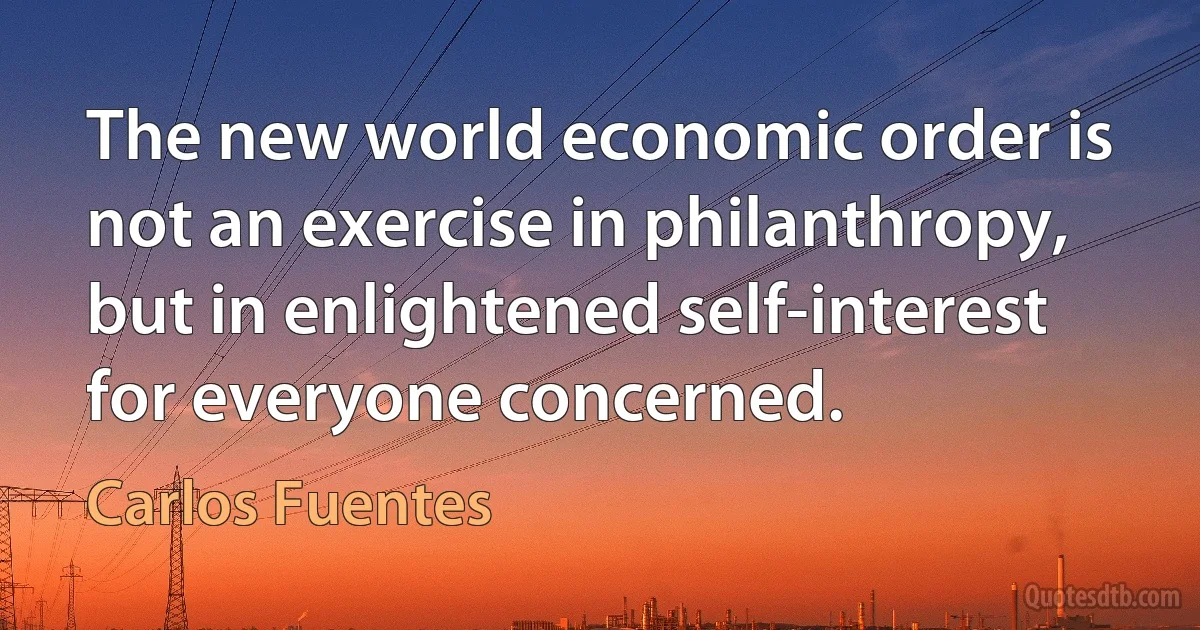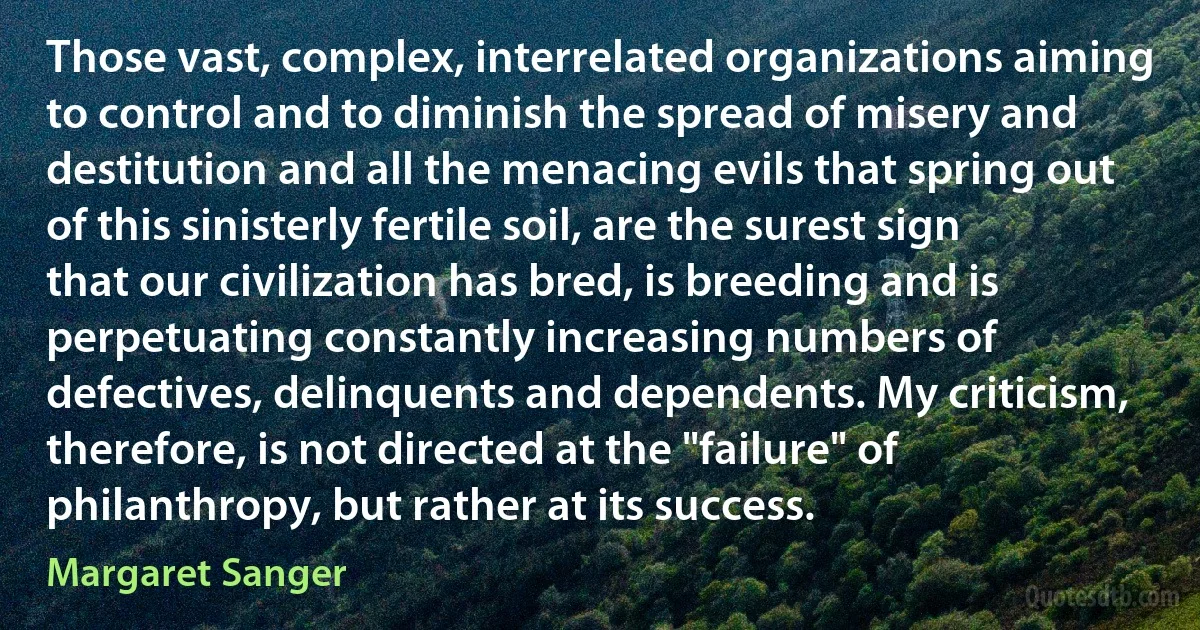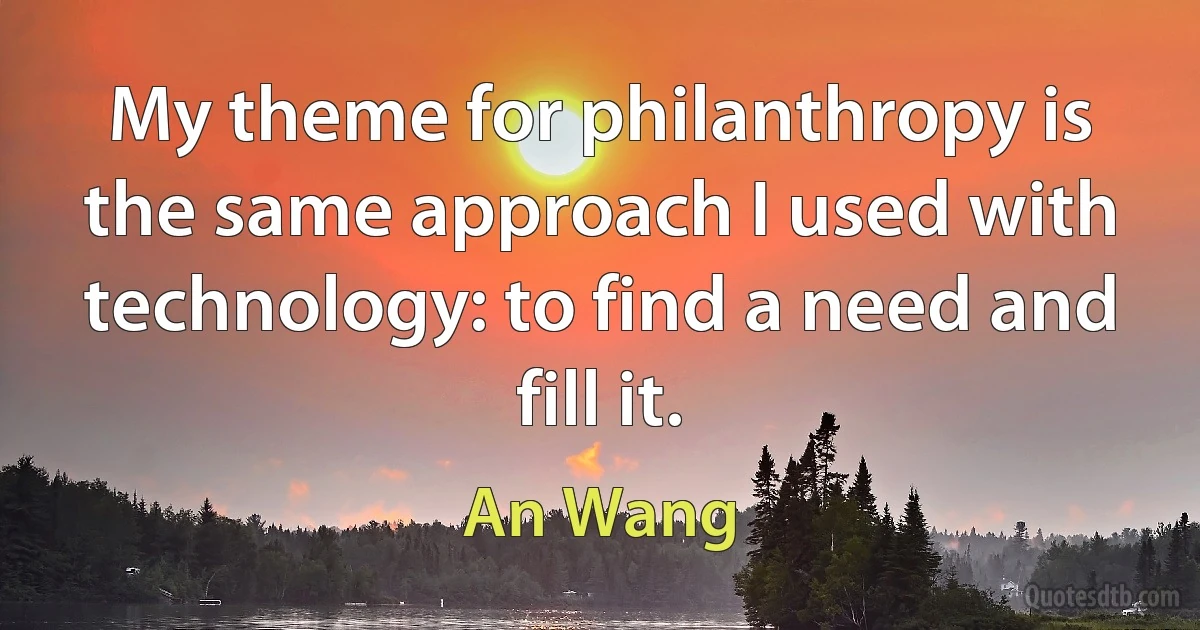Philanthropy Quotes - page 2
If not in coin you must pay in humiliation of spirit for every benefit received at the hands of philanthropy. As Cæsar had his Brutus, every bed of charity must have its toll of a bath, every loaf of bread its compensation of a private and personal inquisition. Wherefore it is better to be a guest of the law, which, though conducted by rules, does not meddle unduly with a gentleman's private affairs.

O. Henry
The Society will live on into and through the twentieth century. It will gradually leaven and permeate the great mass of thinking and intelligent people with its large-minded and noble ideas of Religion, Duty, and Philanthropy. Slowly but surely it will burst asunder the iron fetters of creeds and dogmas, of social and caste prejudices; it will break down racial and national antipathies and barriers, and will open the way to the practical realization of the Brotherhood of all men.

Helena Petrovna Blavatsky
Theorist, and trifler though I may be called, I again assert as our first and holiest duty, the elevation and enlightenment of the proletariate: I again call on those nobler spirits among us who are working erroneously, it may be, but with incipient or growing sincerity and nobleness of mind, to divert their strenuous effort from the promotion of narrow class interests, from silly squabbles about offices and salaried positions, from a philanthropy laudable in itself and worthy of rational pursuit, but meagre in the range of its benevolence and ineffectual towards promoting the nearest interests of the nation, into that vaster channel through which alone the healing waters may be conducted to the lips of their ailing and tortured country.

Sri Aurobindo
The chaplain had mastered, in a moment of divine intuition, the handy technique of protective rationalization, and he was exhilarated by his discovery. It was miraculous. It was almost no trick at all, he saw, to turn vice into virtue and slander into truth, impotence into abstinence, arrogance into humility, plunder into philanthropy, thievery into honor, blasphemy into wisdom, brutality into patriotism, and sadism into justice. Anybody could do it; it required no brains at all. It merely required no character.

Joseph Heller
This code is indispensable. Be it a case of commerce, industry, politics, religion, war or philanthropy in every concern there is a management function to be performed and for its performance there must be principles, that is to say acknowledged truths regarded as proven on which to rely.

Henri Fayol
I am no citizen of the world. It is quite enough for me to think about what is best for England, Ireland and Scotland. I do not like those whose philanthropy is so enlarged as to look, as Rousseau said, to Tartary for objects of affection and commiseration, while their own countrymen are starving, or existing on sea-weed and nettles. I do not approve of any efforts to urge our Government to interfere at all in the affairs even of Poland: it is too distant, too out of the way of our affairs, that we should take one single meal from a weaver or a ploughman for the sake of doing good to the Poles.

William Cobbett
"If charity and philanthropy is not connected with any ulterior motive, they are beneficial. But charity and conversions cannot go together. Religion prospers only when charity and philanthropy are undertaken without any motive. ... The poor and illiterate may enjoy religious freedom without any fear. We have to be particularly vigilant about the Scheduled Tribes whose protection is not only guaranteed by the laws of the land but is also enshrined in the Constitution. It is our duty to preserve every aspect of their way of life along with their religion and ways of worship. No group belonging to any creed should interfere with their religion and rituals. Other organizations are also engaged in the philanthropic work... But that work can be helpful only when it is done without any ulterior motive.

Morarji Desai
Gautier says, "Baudelaire abhorred philanthropy, progressivists, utilitarians, humanitarians and utopianists.” In other words, Baudelaire condemned Rousseausism in all its forms. Today, Rousseausism has so triumphed that the arts and the avant-garde are synonymous with liberalism, an error enforced by literature teachers, with their humanist bias. I follow the Decadents in trying to drive Rousseauist benevolence out of the discourse in art and literature. The Decadents satirized the liberal faith in progress with sizzling prophecies of catastrophe and cultural collapse.

Camille Paglia
From all evil against which the law bars you, you should be barred, at an infinite distance, by honour, by conscience, and nobility. Does the law require patriotism, philanthropy, self-abnegation, public service, purity of purpose, devotion to the needs of others who have been placed in the world below you? The law is a great thing, - because men are poor and weak, and bad. And it is great, because where it exists in its strength, no tyrant can be above it. But between you and me there should be no mention of law as the guide of conduct. Speak to me of honour, of duty, and of nobility; and tell me what they require of you.

Anthony Trollope
He (Mr. Cobden) wanted hon. Gentlemen opposite to bring in a little head, as well as a little heart, when they were dealing with this question...he trusted the time was coming when men would no longer rush into hasty legislation prompted by feelings of benevolence and philanthropy alone, but repudiating the facts of that science which taught how to legislate with something like probability of the result being for the general benefit of the community. He did not oppose interference between masters and men for the sake of employers alone; he opposed all interference whatever with the labour of adults, primarily for the sake of the adults themselves. If they were to establish the principle that Parliament would not interfere at all with labour, and would not interfere between masters and workmen, it would be the best thing for the working men that that House could do.

Richard Cobden
The more I thought it over, Kemp, the more I realised what a helpless absurdity an Invisible Man was-in a cold and dirty climate and a crowded civilised city. Before I made this mad experiment I had dreamt of a thousand advantages. That afternoon it seemed all disappointment. I went over the heads of the things a man reckons desirable. No doubt invisibility made it possible to get them, but it made it impossible to enjoy them when they are got. Ambition-what is the good of pride of place when you cannot appear there? What is the good of the love of woman when her name must needs be Delilah? I have no taste for politics, for the blackguardisms of fame, for philanthropy, for sport. What was I to do? And for this I had become a wrapped-up mystery, a swathed and bandaged caricature of a man!

H. G. Wells
In the history of madness, two events signal this change with singular clarity: in 1657, the founding of the Hôpital Général, and the Great Confinement of the poor; and in 1794, the liberation of the mad in chains at Bicêtre. Between these two singular and symmetrical events, something happened, whose ambiguity has perplexed historians of medicine: blind repression in an absolutist regime, according to some, and, according to others, the progressive discovery, by science and philanthropy, of madness in its positive truth. In fact, beneath these reversible meanings, a structure was taking shape, which did not undo that ambiguity but was decisive for it. This structure explains the passage from the medieval and humanist experience of madness to the experience that is our own, which confines madness in mental illness.

Michel Foucault
More than 99% of my wealth will go to philanthropy during my lifetime or at death. Measured by dollars, this commitment is large. In a comparative sense, though, many individuals give more to others every day.
Millions of people who regularly contribute to churches, schools, and other organizations thereby relinquish the use of funds that would otherwise benefit their own families. The dollars these people drop into a collection plate or give to United Way mean forgone movies, dinners out, or other personal pleasures. In contrast, my family and I will give up nothing we need or want by fulfilling this 99% pledge.
Moreover, this pledge does not leave me contributing the most precious asset, which is time. Many people, including - I'm proud to say - my three children, give extensively of their own time and talents to help others. Gifts of this kind often prove far more valuable than money.

Warren Buffett
This tribune was the terror of every tyranny and fanaticism, it was the hope of every one who was oppressed under Heaven. Whoever placed his foot upon that height, felt distinctly the pulsations of the great heart of mankind. There, providing he was a man of earnest purpose, his soul swelled within him, and shone without. A breath of universal philanthropy seized him, and filled his mind as the breeze fills the sail; so long as his feet rested upon those four planks, he was a stronger and a better man; he felt at that consecrated minute as if he were living the life of all the nations; words of charity for all men came to his lips; beyond the Assembly, grouped at his feet, and frequently in a tumult, he beheld the people, attentive, serious, with ears strained, and fingers on lips; and beyond the people, the human race, plunged in thought, seated in circles, and listening.

Victor Hugo
Businesses must reconnect company success with social progress. Shared value is not social responsibility, philanthropy, or even sustainability, but a new way to achieve economic success. It is not on the margin of what companies do but at the center. We believe that it can give rise to the next major transformation of business thinking.

Michael E. Porter
I have found philanthropy deeply satisfying work. I encourage all people to engage in giving to others, be it through time or money. The point is to be involved. Helping is a joyful experience and enriches the giver as much as those who receive. By enabling people to do good work, I participate in a brighter future for the Jewish people and, I hope, all of humanity.

Edgar Bronfman, Sr.



